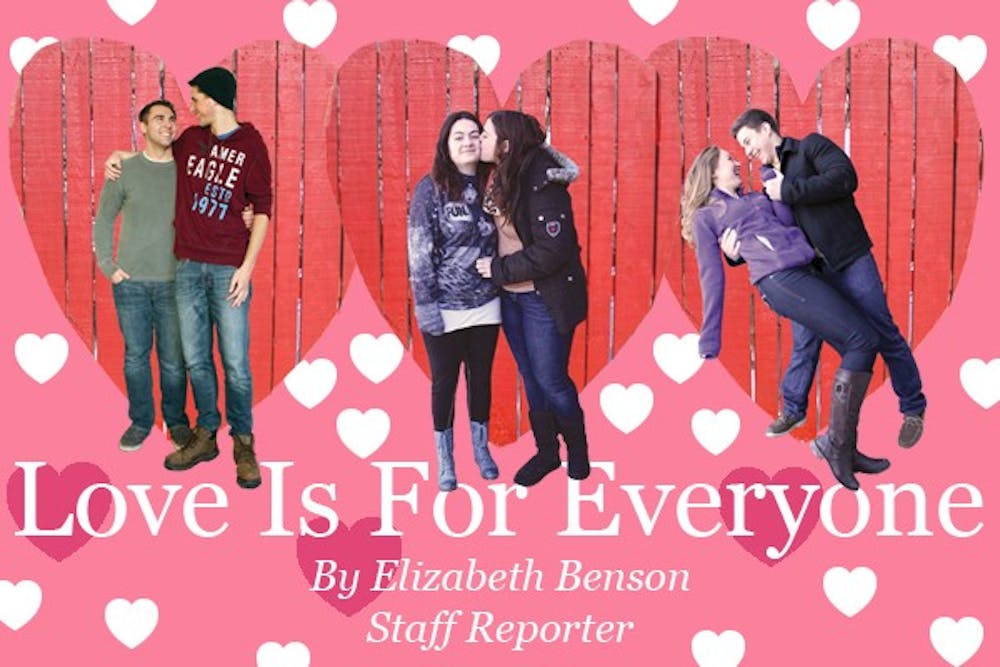Valentine's Day growing more diverse, but still has room for improvement
Diversity is rarely a subject that comes up on Valentine's Day.
Advertisements, media, main-stream pop culture, and society in general have in their minds one specific type of couple that celebrates Valentine's Day – white, heterosexual, cisgender individuals.
Some find the lack of any other type of love or relationship being widely viewed in mainstream media is appalling. Everything about the holiday seems to be geared toward one specific demographic.
"Most commercials show a man giving a woman flowers or a ring," said Krystal Diel, a Lake Orion sophomore and social work major. "Advertisements could depict gay or lesbian couples, too. A lot of stores have 'for him' and 'for her' gift sections. Instead, they could just have 'for that special someone' for their Valentine's display. We need more images depicting all different kinds of love to show they are all valid and important."
Other students, fed up with the singular feel of the holiday, are choosing to focus on what they can do on Central Michigan University's campus to spread inclusion.
"One way CMU could be more inclusive is to take care not to feature only straight, cisgender, white, able-bodied couples when planning, promoting and talking about Valentine's Day events," said Kai Niezgoda, a sophomore from Royal Oak and a member of Students Advocating Gender Equality. "I think it's important to treat your significant other with love, respect, kindness and consideration and equality every day of the year."
Over the years, people have questioned the legitimacy of this holiday, saying it was created by card and candy companies to trick people in relationships into spending outrageous amounts of money on their significant others, instead of doing something actually meaningful.
Bowling Green Ohio senior Emma Tuthill, a SAGE member, said relationships might not have the most solid foundation if they are dependent on the scenario of making an effort in one's relationship on one holiday.
"I really do feel that, as far as holidays go, Valentine's Day relies on stereotypes," Tuthill said. "If you want to celebrate because you enjoy holidays or flowers and chocolate, then go for it. There's nothing inherently wrong with those things. The problem comes in when the stereotypes involved in holidays like this are made to feel obligatory."
The best advice, as Tuthill said, is to do what's best for your relationship, no matter what that might be.
The actual concept of the holiday – namely, setting aside a day to show your loved ones how much you appreciate them – is great, but the way it's portrayed in society is not, said Brutus sophomore Alexis Achterhof.
"The way it's advertised in media is predominantly geared toward cisgender heterosexual couples, which defeats the purpose and makes it seem to be about a very particular demographic," Achterhof said. "Our culture is starting to take small steps away from that, like showing some gay couples in advertisements, but that's a long way from portraying the total spectrum of love and relationships that are out there."
There are others who believe, however, that this generation has progressed beyond this, and that the problem of Valentine's Day isn't really a problem at all.
"I don't think Valentine's Day is race or gender specific," said Deanna Staton, a Grand Ledge senior. "In today's society, I feel like people who do not appreciate interracial or homosexual love are the minority. Times are changing. I feel so lucky and blessed to be able to spend Valentine's Day with my boyfriend out in public at a restaurant. Fifty years ago that never would have happened. And 50 years from now, I imagine people will look back and laugh upon how small-minded we have been.
"Yes, Valentine's Day is a commercial holiday, but it's also a chance to recognize all the love that two humans can share. Love is love"




